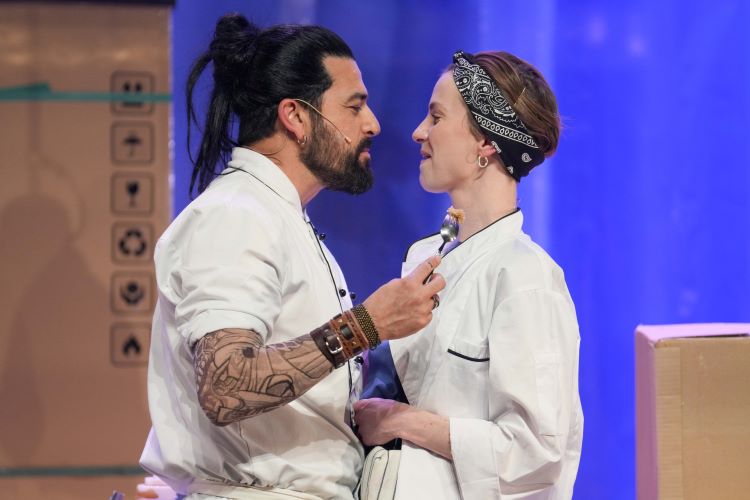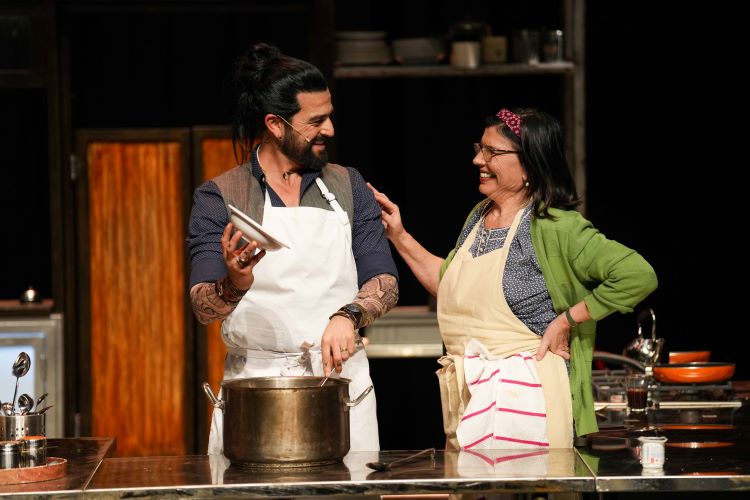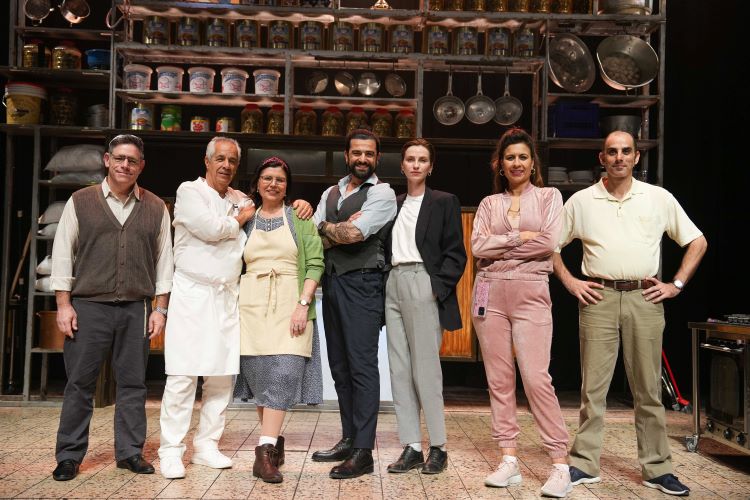Warm and lively, The Son of the Great Moshiko, written by Gil Ari Cohen and directed by Irad Rubinstain, is concerned with familiar themes of family, masculinity, and the generation gap, yet succeeds in delightfully surprising the viewer at every turn. Sharp characterization and excellent comic performances provide a tangy touch that cuts through any potential sentimental stickiness, even as it touches the heart.

The play has a culinary theme that works well both literally and metaphorically, as it explores a son’s relationship to his father. Noam (Amos Tamam), a talented chef, is about to open a new bistro in Paris, together with his life partner Dani (Anastasia Fein). Although he was brought up with a culinary legacy – his father Moshiko’s humus place, where all family members were expected to pitch in – it is one that he is eager to reject. Embracing the new in ingredients and methods, Noam has long since made a clean break with the past and that includes any traces of Israeli or Middle Eastern cuisine in the bistro’s menu. He’s even changed his name from the ethnically revelatory “Amar” to the more basic Israeli “Amir”.

Yet the life of a chef is not without its risks and complications, and to open the bistro as planned, Noam and Dani need money, lots of it, and now! Help comes from a very unlikely source – Noam’s recently deceased father Moshiko. The infusion of the supernatural gives the play a fun twist, and Mati Seri is wonderful as the charismatic yet single-mindedly stubborn and manipulative Moshiko. Yet the promise of an inheritance does not come without conditions. Noam must go back to the last place he wants to be – the family humus place, named for its former owner, the Great Moshiko. The set design by Adam Keller, which suggests the kitchen of a trendy, Parisian bistro with a few deft touches, easily transforms into the backend of the humus place, complete with a wall of shelves loaded with jars and jars of olive oil, spices and the requisite nargila, that also offers the ghostly Moshiko a pleasant place to perch and observe events from on high.

As Noam reluctantly returns to the family business, he is met with a mixed reception. His mother Miri (Rita Shukrun) is thrilled to think that her rebellious son is finally coming home. Shukrun plays the traditional mother with perfect comic timing, her comments on available apartments nearby and other motherly advice is measured out in just the right amount to suggest Noam’s suffocation, yet never turns her character into a caricature. Noam’s sister Michali (Moran Arbiv Gans), the good girl who stayed at home, got married, had kids, and still works at the humus place, surges with repressed and not-so-repressed anger and resentment, and she is hilariously funny. The sibling vibes between Michali and Noam are perfect. Adding to the comic mix is a broader, yet no less precise, funny and endearing, character – Ran (Tal Weiss) Michal’s sweet, yet kind of clueless husband. Contributing flavor to this dish is Simcha Barbiro who amuses in several, internationally diverse, roles – as a Parisian lawyer, Israeli lawyer, and humus enthusiast.

In telling a generational story through food, Gil Ari Cohen touches on something quintessentially Israeli. The Israeli kitchen is richly textured, diverse, and complicated, drawing on centuries of diaspora and wandering, cooking, and eating along the way. As Noam says in the play, at least in one sense, there is no Israeli kitchen. And yet, we recognize it – in the merging of ethnic traditions, in the enthusiasm for culinary innovation, and in our humus, a central part of Israeli cuisine and culture. The metaphor of cuisine as the arena for Noam’s complicated relationship with Moshiko, also introduces the nuances of ethnic origins and the invisible yet ever-present assumed hierarchy in which Paris is somehow more elevated than the Middle East. Depicting the timeless struggle for individuation and independence present in every relationship between parent and child in a crisp and savory manner, The Son of the Great Moshiko is a refreshing pleasure for the emotional palate.
The Son of the Great Moshiko
A Sentimental Comedy by Gil Ari Cohen
Directed by Irad Rubinstain
Sets: Adam Keller; Costumes: Moni Mednik; Original Music: Roy Yarkoni; Lighting: Matan Preminger; Movement: Gal Sabo; Dramaturge: Gur Koren; Associate Director: Eliana Magon; Producer: Adi Polyak; Cast: Amos Tamam – Noam, Anastasia Fein – Danielle, Mati Seri – Moshiko, Rita Shukrun – Miri, Moran Arbiv Gans – Michali, Tal Weiss – Ran, Simcha Barbiro – Attorney Claude/Attorney Baruch/Hanan





